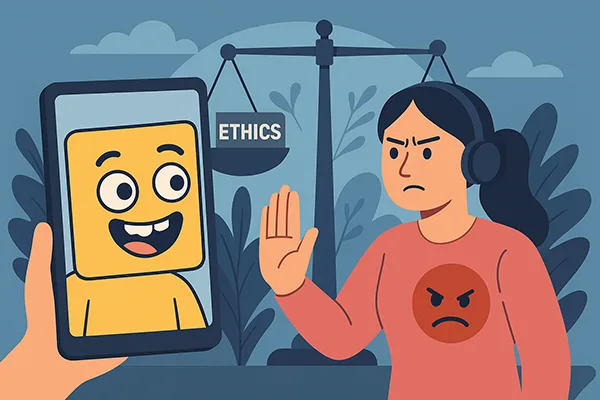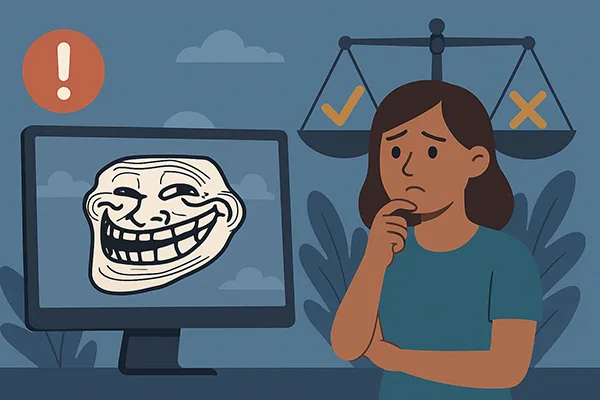
Meme Culture vs Ethics: When Social Media Humour Crosses the Line
Meme culture has become a powerful form of digital expression, shaping how users comment on social issues, politics, and everyday life. However, as these humorous images and jokes become more widespread, ethical concerns about their content and impact continue to grow. In early 2025, the debate between free speech and responsible digital behaviour remains more relevant than ever.
When Humour Masks Harm: The Hidden Side of Memes
Memes are often viewed as light-hearted entertainment, but many conceal harmful messages under the guise of satire. Jokes targeting marginalised groups frequently go unchallenged, blending racism, sexism, or ableism into supposedly harmless humour. When such content is normalised, it contributes to the reinforcement of stereotypes and systemic discrimination.
Recent examples include memes that belittle mental health conditions or mock feminist movements. These aren’t just tasteless jokes—they shape public attitudes. The line between edgy humour and harassment becomes blurry when irony is used to shield intentional cruelty. As of February 2025, this continues to be a growing issue on major platforms.
The lack of consequences for creators of offensive memes further encourages their spread. Unlike traditional media, where regulations and editors filter harmful content, social networks rely heavily on users to report violations. This reactive approach allows damaging memes to circulate widely before action is taken—if any action is taken at all.
Not Just Jokes: Memes as Vehicles of Discrimination
Memes have become a modern-day propaganda tool in some circles, where seemingly humorous content is strategically crafted to push ideologies. Whether mocking certain communities or trivialising sensitive topics, these memes can radicalise opinions and isolate vulnerable users. The danger lies in how they blur intent: are they joking, or are they serious?
Studies from digital ethics researchers in 2024 highlighted that many meme creators deliberately include layers of irony to deflect accountability. When challenged, they respond with “it’s just a meme”, but that argument is increasingly weak in the face of real-world consequences. Online hate doesn’t stay online—it impacts people offline too.
In Denmark, Germany, and the UK, several legal discussions have emerged about where humour ends and hate speech begins. Memes that incite hatred, even if they are layered in humour, could soon face stricter regulation. As the legal and ethical boundaries evolve, the meme space may be forced to become more accountable.
Why Algorithms Fail to Filter Harmful Content
Most social media platforms rely on machine learning and AI-driven moderation tools to monitor inappropriate content. Yet, memes often slip through the cracks. These tools are typically trained on text-based content and struggle with interpreting layered, image-based humour that contains cultural or contextual meaning.
Memes are notoriously difficult to moderate algorithmically because they mix text with visuals, use slang, and evolve rapidly. A meme template that was innocent one month might be repurposed the next for spreading hate speech. The adaptability of meme culture makes it challenging for automated systems to keep up without a high rate of false positives or negatives.
Platforms like Facebook and TikTok have invested heavily in AI moderation, but even by early 2025, their effectiveness remains inconsistent. Reddit, for example, relies heavily on community moderation, which introduces bias and uneven enforcement across subreddits. Harmful memes often gain traction in echo chambers before they’re ever flagged.
The Human Factor: Moderation Needs Context
Automated systems lack the cultural and linguistic nuance to differentiate between satire, parody, and hate. Human moderators are essential, but the scale of content makes it nearly impossible to rely solely on manual review. This leads to inconsistency: some harmful memes are removed, while others remain online for weeks or never at all.
Moreover, moderators themselves often experience burnout and psychological stress from constant exposure to disturbing content. This raises concerns about the sustainability of relying on underpaid workers to serve as digital gatekeepers. Tech companies have yet to provide long-term solutions that balance automation with ethical human oversight.
By February 2025, experts in digital governance have proposed hybrid moderation models that combine AI with region-specific human reviewers. While promising, these models require significant investment and transparency, which some platforms are reluctant to provide due to cost and public scrutiny.

How Platforms Are Responding to the Ethics of Memes
Some social networks have begun taking more decisive action to address the ethical issues surrounding memes. Instagram and Reddit, for instance, updated their content policies in late 2024 to include clearer guidelines on meme-related hate speech and misinformation. These updates aim to close the loopholes that allowed offensive content to circulate under ambiguous terms.
Instagram now labels certain meme content as “potentially harmful” and uses blur filters before users can view it. Reddit has empowered moderators of larger communities to enforce stricter meme guidelines, even allowing the banning of meme templates that have been repeatedly misused. These steps show a growing recognition of the real-world harm memes can cause.
Yet, critics argue that enforcement still lags behind policy. Users with large followings can often post controversial memes without facing penalties, while smaller accounts are flagged more quickly. This inconsistency continues to erode trust in platforms’ commitment to ethical standards and equal treatment of all users.
Community-Driven Change: Users Holding Platforms Accountable
In 2025, user-led activism is playing a larger role in pressuring platforms to take meme ethics seriously. Campaigns on X (formerly Twitter) and Instagram have led to the removal of popular meme pages that repeatedly posted racist or misogynistic content. Public reporting and digital petitions have made it harder for companies to ignore the problem.
Some communities are also educating users about the ethical implications of meme sharing. Pages dedicated to “meme literacy” encourage critical thinking before sharing content that may seem funny but carries offensive undertones. This cultural shift is gradual, but it signals a growing awareness of online responsibility.
The future of meme culture will depend on how effectively platforms and users balance humour with harm. As online spaces mature, the demand for ethical engagement continues to rise. Memes may be humorous by nature, but their consequences are anything but trivial.
